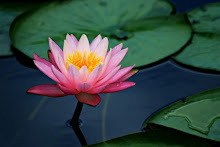
The following passage is taken from The Transport of Love - The Meghadûta of Kâlidâsa translated and Leonard Nathan (1976, University of California). I think it describes quite accurately the Western vs. Eastern attitude towards art, in this case poetry.
"Where we look for close adherence to phychological and physical reality, the INdian poet rigorously excludes verisimilitude. Where we expect the poet to speak in his own voice - a voice that should be at once close to common speech and yet identifiably original - the Indian poet stays far behind his subject and stives at every turn for uncommon eloquence which yet deliberately echoes the voices of his tradition. Where we are prepared for, il not direct conflict, at least strong tension needing drastic resolution, the Indian poet gives us the slow unfolding of a foregone conclusion. Where we might hope to feel the pleasure of new insight, the Indian poet wants his audience to experience the delight of a foreknown universal sentiment. IN short, the poet was not expected to bring raw news of himself or the world, to lay out the complexities of social relations, or to flash light on the dark interior life of the particularized soul. He was asked instead to proffer the experience of the ideal, all the flaws of nature corrected, all the unfinished aims of men completed, everything in its proper place, performing its proper function in an orderly, therefore beautiful way. (...)
Behind INdian poetic expectation and the poems addressed to it were two major assumptions that we do not share. First, that reality was not to be sought through personal sensory apprehension of our changing empirical world, but beyond it to one that is permanent and ideal. One way the latter could be apprehended was through language that matches the ideal in its permanence and perfection. That language was Sanskrit in its poetic mode. Poems, then, were a way of experiencing the reality beyond appearance, and the pleasure one derived from reading or hearing them was, in the view of respected critics, analogous to the personal bliss arrived at by the religious experience of the divine truth. The second assumption concerned the hierarchical social system developed in India from Vedic times. This system was, according to the traditional view, based upon the rock of divine order. To understand it was, therefore, to approve it, realizing its faults to be the result merely of the shortcomings in those who failed to adhere to its rules, to dharma. The unspoken contract between Kâlidâsa and his audience assimilated these assumptions so thoroghly that they enter into every element of the Meghadûta and must be kept continually in mind if we are to understand what its proper audience experienced in the presence of the poem."

2 comments:
Good post and this post helped me alot in my college assignement. Thanks you seeking your information.
I'm happy it was of use!
good luck in your studies!
Post a Comment